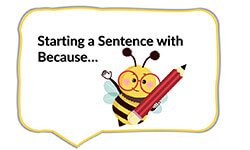
It is a common misconception that starting a sentence with “because” is informal. Thus, many avoid this in the realm of academic writing. In reality, it is acceptable to begin a sentence with “because” if it is done correctly. In fact, with proper use, it can add emphasis and nuance to an argument. As this topic is widely debated, this article aims to provide an in-depth guide for effectively integrating sentences starting with “because” without losing scholarly tone or clarity within an academic context.
Definition: Starting a sentence with because
“Because” is a conjunction that is often used to introduce a clause that expresses a cause or reason. Usually, when starting a sentence with “because,” you present the reasoning or explanation first, which is then followed by the outcome or conclusion.
Dos and don’ts of starting a sentence with because
There are scenarios when it is effective to start a sentence with “because,” however, there are also aspects to consider refraining from using “because” at the beginning of the sentence.
Dos
- Ensure the sentence has both an independent clause and a dependent clause.
- Make clear the relationship between the clauses.
- Use because to start a sentence for variety in your writing.
Don´ts
- Begin a sentence with because if it results in a sentence fragment.
- Overuse the method of starting sentences with because.
- Make your writing seem repetitive or redundant.
Grammatical mistakes and examples
A common error when starting a sentence with because is creating a sentence fragment. A sentence fragment lacks an independent clause, which is a group of words that can stand alone as a sentence.
This is a sentence fragment because it does not complete the thought – the consequence of being late is not expressed making the context incomplete.
Dependent and independent clauses
When starting a sentence with “because,” it’s crucial to understand the relationship between dependent and independent clauses.
- A dependent clause, such as “because I was late,” cannot stand alone as a complete thought.
- An independent clause, on the other hand, such as “I missed the bus,” can stand alone as a complete sentence.
In a sentence starting with “because,” the clause following because is usually a dependent clause and needs to be followed by an independent clause to form a complete sentence.
FAQs
You can, but it’s not recommended. Use this structure only when it enhances clarity or adds variety to your writing style.
Yes, it is formal as long as the sentence is grammatically correct and includes both a dependent clause and an independent clause.
Not necessarily. It only becomes a fragment if it lacks an independent clause.
